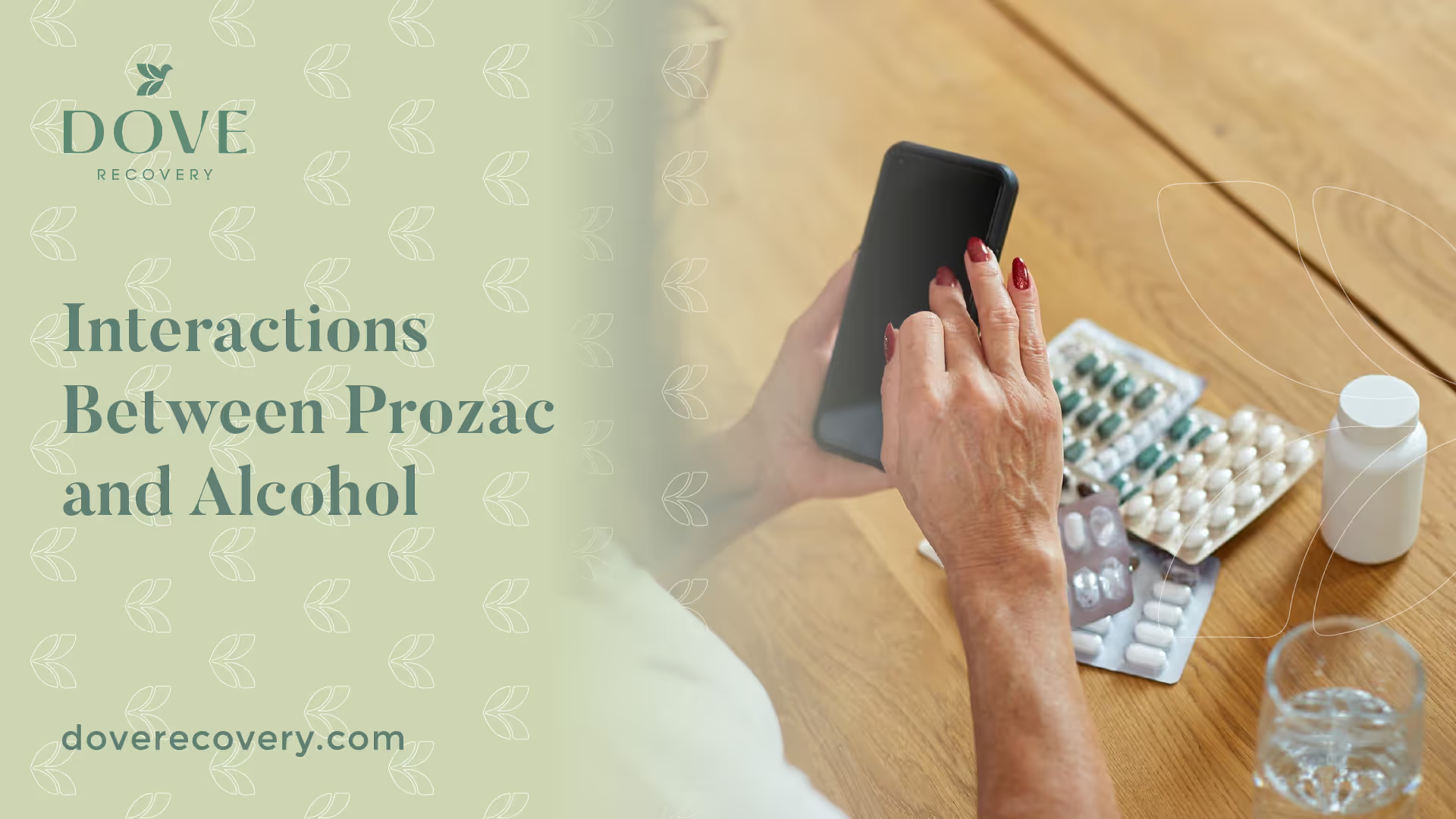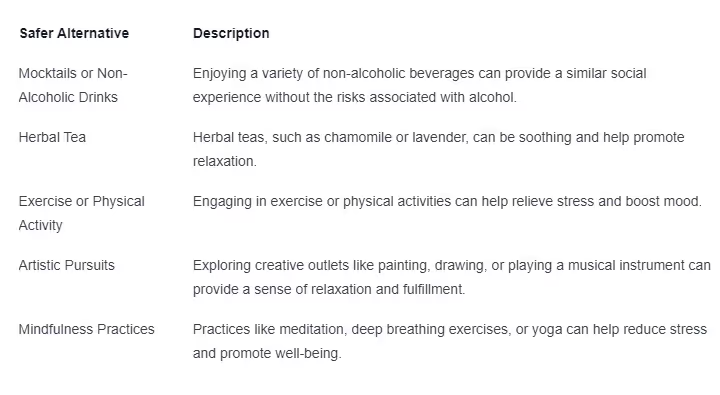Interactions Between Prozac and Alcohol

Prozac and Alcohol Interaction: What You Need to Know
Understanding the potential interaction between Prozac and alcohol is crucial for individuals who are prescribed Prozac and consume alcohol. It is important to be aware of the risks associated with mixing these substances to make informed decisions about your health.

Understanding Prozac and Alcohol
Prozac, also known by its generic name fluoxetine, is an antidepressant medication that belongs to a class of drugs called selective serotonin reuptake inhibitors (SSRIs). It is commonly prescribed to treat depression, anxiety disorders, and other mental health conditions. Prozac works by increasing the levels of serotonin, a neurotransmitter in the brain, which helps regulate mood.
Alcohol, on the other hand, is a central nervous system depressant that affects the brain and can alter mood and behavior. It is a commonly consumed psychoactive substance that can have sedative effects.
The Risks of Mixing Prozac and Alcohol
When Prozac and alcohol are combined, there are potential risks and interactions that individuals should be aware of. It is important to note that these risks can vary depending on factors such as the individual's overall health, dosage of Prozac, and amount of alcohol consumed.
One of the main concerns of mixing Prozac and alcohol is the potential for increased side effects. Both substances can cause drowsiness, dizziness, and impaired coordination. When consumed together, these effects may be intensified, increasing the risk of accidents or falls.
Alcohol can also have a negative impact on mental health, and mixing it with Prozac may interfere with the intended therapeutic effects of the medication. Prozac is prescribed to help stabilize mood and alleviate symptoms of depression and anxiety. Alcohol, on the other hand, is a depressant that can worsen symptoms of depression and anxiety, making it more difficult to manage these conditions effectively.
To understand the specific side effects and risks associated with mixing Prozac and alcohol, it is essential to consult with a healthcare professional. They can provide personalized guidance based on your individual circumstances and help you make informed decisions regarding the use of alcohol while taking Prozac.
By understanding the potential risks and being aware of the effects of both Prozac and alcohol, individuals can make informed decisions about their health and well-being. It is crucial to consult with a healthcare professional about the use of alcohol while taking Prozac to ensure the best possible outcomes for your mental health.
How Prozac Works
To understand the potential interaction between Prozac and alcohol, it's important to have a basic understanding of how Prozac works and its effects on the brain.
Overview of Prozac
Prozac, also known by its generic name fluoxetine, is a medication commonly prescribed to treat conditions such as depression, obsessive-compulsive disorder (OCD), panic disorder, and bulimia nervosa. It belongs to a class of medications called selective serotonin reuptake inhibitors (SSRIs).
Prozac works by increasing the levels of serotonin, a neurotransmitter, in the brain. Serotonin is involved in regulating mood, emotions, and behavior. By inhibiting the reuptake of serotonin, Prozac helps to maintain higher levels of serotonin in the brain, which can improve mood and alleviate symptoms of various mental health conditions.
Effects of Prozac on the Brain
When Prozac is taken as prescribed, it selectively inhibits the reuptake of serotonin in the brain, allowing it to remain active for longer periods. This increased availability of serotonin can help regulate mood and promote a sense of well-being.
By targeting serotonin, Prozac influences the communication between nerve cells, or neurons, in the brain. This interaction helps to restore balance to the neurotransmitter system, which may be disrupted in conditions such as depression or anxiety disorders.
It's worth noting that the full therapeutic effects of Prozac may take several weeks to manifest. It is important to continue taking the medication as prescribed by a healthcare professional and to consult them if any concerns arise regarding its effects.
Understanding how Prozac works is essential when considering its potential interaction with alcohol. Additionally, it's crucial to be aware of potential side effects and withdrawal symptoms that may occur when combining Prozac and alcohol.
How Alcohol Affects the Brain
Alcohol is a central nervous system depressant that affects the brain by altering its normal functioning. It primarily acts on the neurotransmitters, which are chemical messengers responsible for communication between brain cells. Alcohol enhances the effects of gamma-aminobutyric acid (GABA), a neurotransmitter that inhibits brain activity, resulting in a sedative effect.
Excessive alcohol consumption can lead to a range of effects on the brain, including:
- Impaired judgment and decision-making abilities
- Slowed reaction times and coordination
- Memory loss and blackouts
- Changes in mood and behavior
- Disruption of sleep patterns
These effects can be intensified when alcohol is consumed in combination with certain medications, such as Prozac.
Alcohol's Impact on Mental Health
While some individuals may turn to alcohol as a means of self-medication for mental health issues, the reality is that alcohol can exacerbate these conditions in the long run. Alcohol's impact on mental health can vary depending on factors such as the amount consumed and individual susceptibility.
Alcohol consumption can contribute to or worsen mental health conditions, including:
- Depression: Alcohol is a depressant and can intensify feelings of sadness or hopelessness.
- Anxiety: Alcohol can temporarily reduce anxiety symptoms, but it often leads to rebound anxiety and increased overall anxiety levels.
- Bipolar disorder: Alcohol can disrupt mood stability and interfere with medication effectiveness.
- Sleep disorders: Alcohol can disrupt sleep patterns, leading to poor sleep quality and exacerbating sleep disorders.
It is crucial to consider these effects when evaluating the potential risks of mixing Prozac, an antidepressant medication, with alcohol. Always consult with your healthcare provider to understand the specific interactions and risks based on your individual circumstances. Open communication with your doctor is key to ensuring your mental health and well-being.
Potential Interactions between Prozac and Alcohol
When considering the combination of Prozac and alcohol, it's important to be aware of the potential interactions that can occur. Mixing Prozac, an antidepressant medication, with alcohol can lead to increased risk of side effects and reduced effectiveness of Prozac.
Increased Risk of Side Effects
Combining Prozac and alcohol can increase the likelihood and severity of certain side effects. Alcohol is a central nervous system depressant, and when combined with Prozac, its effects can be amplified. This can result in excessive drowsiness, dizziness, and impaired coordination. Moreover, both Prozac and alcohol can affect liver function, and their combined use may put additional strain on the liver, potentially leading to liver damage or impairment.
To understand the specific side effects that may occur when Prozac and alcohol are mixed, it's crucial to consult with a healthcare professional. They can provide personalized guidance based on your specific medical history and circumstances.
Reduced Effectiveness of Prozac
Alcohol consumption can interfere with the effectiveness of Prozac in treating depression and other mental health conditions. Alcohol is known to disrupt neurotransmitter levels in the brain, and this interference can hinder the intended therapeutic effects of Prozac. Additionally, alcohol itself can have a negative impact on mental health and exacerbate symptoms of depression.
If you are taking Prozac to manage a mental health condition, it is vital to prioritize your well-being by avoiding alcohol or consulting with your healthcare provider before consuming alcohol. They can provide guidance on the safest course of action and may recommend alternative coping strategies or medications if necessary.
Understanding the potential interactions between Prozac and alcohol is crucial for ensuring your safety and well-being. It is always recommended to have an open and honest conversation with your healthcare provider about your alcohol consumption habits and any medications you are taking. They can provide personalized advice and support to help you make informed decisions regarding your mental health and alcohol use.
Risks and Precautions
When it comes to mixing Prozac and alcohol, it's important to be aware of the potential risks and take necessary precautions. While both substances may individually have an impact on the body and mind, combining them can lead to unwanted consequences. Let's explore the potential side effects and some safer alternatives to alcohol.
Potential Side Effects
Mixing Prozac and alcohol can result in several side effects that may vary from person to person. These side effects can be intensified due to the interaction between the two substances. Some common side effects include:

It's essential to note that these side effects can vary depending on individual factors such as dosage, frequency of alcohol consumption, and overall health. To understand the specific risks and potential side effects associated with the combination of Prozac and alcohol, it's crucial to consult with a healthcare professional. They can provide personalized advice based on your unique circumstances.
Safer Alternatives to Alcohol
To minimize any potential risks associated with mixing Prozac and alcohol, it's advisable to explore safer alternatives to alcohol. These alternatives can provide relaxation and enjoyment without the potential negative interactions. Here are a few options to consider:

By opting for these safer alternatives, individuals can enjoy their leisure time while avoiding the potential risks associated with mixing Prozac and alcohol. It's important to remember that everyone's needs and preferences are different, and finding the most suitable alternative might require some experimentation.
If you have concerns or questions about the specific interaction between Prozac and alcohol, it's crucial to have an open and honest discussion with your healthcare provider. They can provide personalized guidance and recommendations based on your individual circumstances. Remember, seeking professional advice is always the best course of action when it comes to your health and well-being.
Talking to Your Doctor
When it comes to the interaction between Prozac and alcohol, it's crucial to have open communication with your healthcare provider. Your doctor is the best resource for understanding how these substances may interact and the potential risks involved. Here are two important aspects to consider when talking to your doctor:
Open Communication
It's essential to have open and honest communication with your doctor about your alcohol consumption and any concerns you may have about mixing it with Prozac. By sharing this information, your doctor can provide personalized advice based on your specific situation. They can take into account factors such as your medical history, current medications, and mental health condition to guide you in making informed decisions.
During your discussion, be sure to mention the frequency and quantity of alcohol you consume. Your doctor needs a clear understanding of your alcohol intake to assess any potential risks and provide appropriate recommendations. Remember, your doctor is there to support you and ensure your well-being, so don't hesitate to ask questions or voice any concerns you may have.
Seeking Professional Advice
Seeking professional advice is crucial when it comes to understanding the interaction between Prozac and alcohol. Your doctor can provide you with accurate and up-to-date information regarding the specific risks and potential side effects associated with mixing these substances. They can also guide you on whether it is safe for you to consume alcohol while taking Prozac or if any precautions need to be taken.
If you are concerned about the potential risks of alcohol consumption while on Prozac, your doctor may suggest safer alternatives to alcohol or provide guidance on ways to manage your mental health without relying on alcohol. It's important to remember that everyone's situation is unique, and what works for one person may not be suitable for another. Your doctor can help tailor a plan that is best suited for your needs.
By having open communication and seeking professional advice, you can navigate the complexities of mixing Prozac and alcohol more effectively. Remember, the goal is to prioritize your mental health and well-being, and your doctor is there to support you throughout your treatment journey.
Conclusion
Alcohol consumption can interfere with the effectiveness of Prozac in treating depression and other mental health conditions. It is important to prioritize your well-being by avoiding alcohol or consulting with your healthcare provider before consuming alcohol. They can provide guidance on the safest course of action and may recommend alternative coping strategies or medications if necessary.
If you do choose to consume alcohol while taking Prozac, it is essential to do so in moderation and with caution. Be aware of the potential side effects and risks associated with mixing these substances, and always consult with your healthcare provider before making any changes to your treatment plan.
Remember, your mental health is a top priority, and taking steps to ensure its well-being is crucial for a fulfilling and healthy life. By working closely with your healthcare provider and making informed decisions about your alcohol consumption, you can effectively manage your mental health condition and enjoy a happy and fulfilling life.
Sources:
- https://www.healthline.com/health/depression/prozac-alcohol#:~:text=Prozac%20can%20interfere%20with%20coordinated,lead%20to%20potentially%20dangerous%20situations.
- https://www.nhs.uk/medicines/fluoxetine-prozac/common-questions-about-fluoxetine/
- https://www.forhers.com/blog/prozac-and-alcohol
- https://vertavahealth.com/blog/effects-of-mixing-prozac-and-alcohol/
